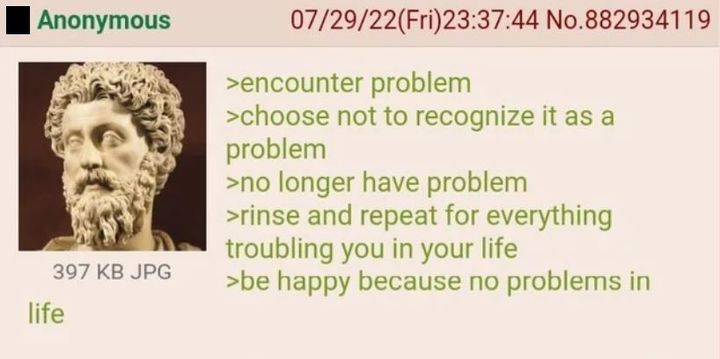Stoics recognize problems in two categories, problems you can fix and problems you can’t. In neither case anxiety adds anything to the solution.
Greentext
This is a place to share greentexts and witness the confounding life of Anon. If you're new to the Greentext community, think of it as a sort of zoo with Anon as the main attraction.
Be warned:
- Anon is often crazy.
- Anon is often depressed.
- Anon frequently shares thoughts that are immature, offensive, or incomprehensible.
If you find yourself getting angry (or god forbid, agreeing) with something Anon has said, you might be doing it wrong.
I should stop choosing to be anxious.
I know it sounds trite and a good candidate for thanksimcured, but essentially, yes. It is not reality that is causing your anxiety but your perception of it, and you have some degree of control over that.
One thing that can tangibly help is to lay out the consequences of inaction. Just knowing the worst case (among likely outcomes) can help reduce anxiety substantially. Then assess how much control you have in addressing the problem and getting a better outcome, and how much effort that will cost you vs the consequences.
A lot of anxiety comes from the unknown. We may not be able to completely unmask the unknown, but we can often estimate the consequences. For example:
- climate change
- worst case: weather patterns will get worse, and life in 50-ish years may totally suck
- options to mitigate problems: move, make more money to afford more mitigations
- control over preventing the problems: vote, reduce own consumption (minimal impact)
- job loss
- worst case: can't afford rent or food, so homelessness possible
- options to mitigate problems: expand circle of friends (more couches to surf), save up cash, get a side gig or two to fall back on
- control over preventing the problem: work for a stable company, improve skills
- break up w/ SO
- worst case: heartbreak, possible depression, ugly breakup could also hurt financially
- options to mitigate problems: separate expenses, keep contact w/ friends, practice healthy behaviors (exercise, engaging hobbies, etc)
- control over preventing the problem - open dialogue, go on regular dates w/ SO, ask friends for warning signs
And so on. If you can identify the worst case scenarios and your options, it's a lot easier to manage anxiety. Doing that can be uncomfortable, but it's basically what a therapist will do with you, so it's a great skill to learn.
This is a great technique, usually referred to as negative visualisation. Epictetus put it like this:
Hold death and exile and all that seems dreadful before your eyes every day, but most of all death: and you will never think of anything bad or desire anything too much.
Memento mori.
Sounds like a good way to develop a suicidal ideation problem.
Quite the opposite. It lets you forget the unimportant things and the constant realization that your time on this earth is finite will drive you to live life to the fullest.
